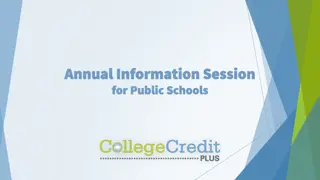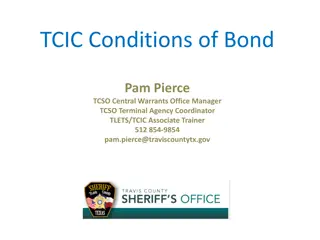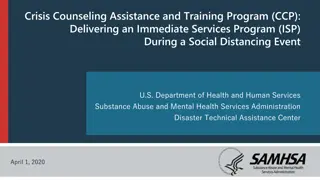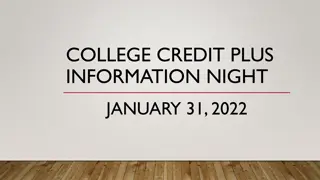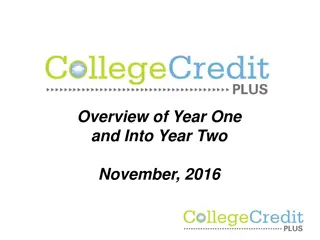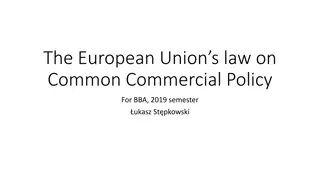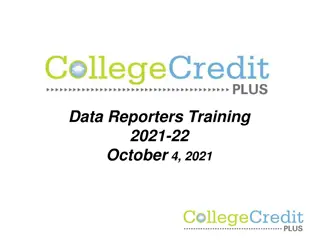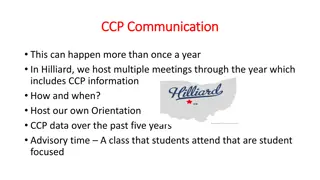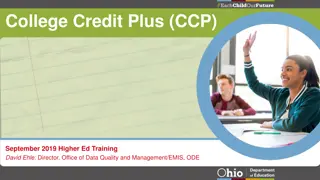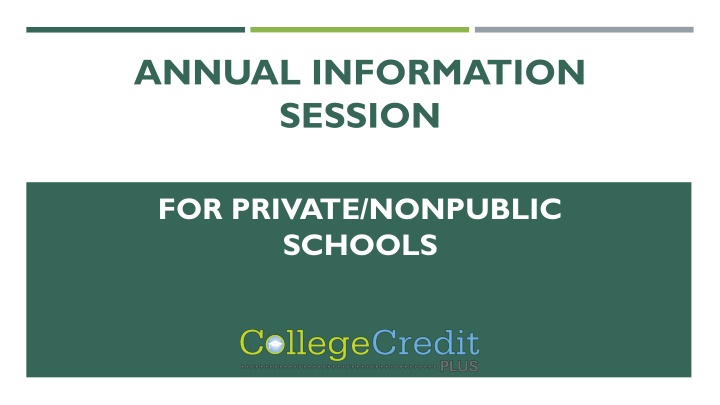
College Credit Plus Program for Grades 7-12
Discover the College Credit Plus program in Ohio, where students in grades 7-12 can earn high school and college credits simultaneously. Learn about eligibility, course options, assessment exams, participation steps, and more. Take advantage of this opportunity to jumpstart your college education while in high school.
Download Presentation

Please find below an Image/Link to download the presentation.
The content on the website is provided AS IS for your information and personal use only. It may not be sold, licensed, or shared on other websites without obtaining consent from the author. If you encounter any issues during the download, it is possible that the publisher has removed the file from their server.
You are allowed to download the files provided on this website for personal or commercial use, subject to the condition that they are used lawfully. All files are the property of their respective owners.
The content on the website is provided AS IS for your information and personal use only. It may not be sold, licensed, or shared on other websites without obtaining consent from the author.
E N D
Presentation Transcript
ANNUAL INFORMATION SESSION FOR PRIVATE/NONPUBLIC SCHOOLS
WHAT IS COLLEGE CREDIT PLUS? College Credit Plus is Ohio s dual credit program Students can earn high school and college credit at the same time Students enroll in college courses and adhere to the policies and requirements of the college
STUDENTS IN GRADES 7-12 Must complete an assessment exam and be determined eligible based on exam scores for College Credit Plus May apply to any public college or participating private college in Ohio May apply to multiple colleges Must be Ohio residents
STUDENTS IN GRADES 7-12 May choose from a variety of college-level courses As determined by placement testing & course eligibility rules Can earn credit to satisfy both high school and college requirements 3 or more Credit Hour College Course converts to One High School Unit
STUDENTS IN GRADES 7-12 Must successfully complete the courses in order to earn the credit Even if a student fails or withdraws from the course, the college transcript and high school transcript will reflect the student s final grade
STUDENTS IN GRADES 7-12 May take classes during the summer, fall, & spring semesters May take courses at the college campus or online
HOW CAN STUDENTS PARTICIPATE? Step 1: Eligibility Students must be eligible for College Credit Plus participation based on assessment exam scores
STUDENT ELIGIBILITY ASSESSMENT EXAMS Students scores must show that they are ready for college- level courses in at least one subtest on an exam such as ACT, SAT, Accuplacer, ALEKS, PlaceU, or MapleSoft Each college/university may have different exam requirements
STUDENT ELIGIBILITY ASSESSMENT EXAMS Colleges and universities will review students scores using statewide standards If a student s scores are not college-level, colleges can consider the student s exam scores if the scores are within a specific range and if the student has: Overall high school GPA of at least 3.0 or Recommendation form/letter (from school counselor, principal, or career-technical advisor)
HOW CAN STUDENTS PARTICIPATE? Step 2: College Admission Students must apply for admission Students must meet admission requirements of the college Contact the college to learn about their requirements, processes, paperwork, and deadlines Colleges have the final decision on student admission
HOW CAN STUDENTS PARTICIPATE? Step 3: Course Registration If the student is considered eligible and has been admitted to the college, then the college will discuss course options with the student, based on assessment scores, prerequisites, and other requirements.
WHAT COURSES CAN A STUDENT TAKE? CCP courses can satisfy high school graduation requirements School counselors can help students understand graduation requirements and CCP course substitutions Some high schools have more requirements for graduation than the state minimum
COURSE ELIGIBILITY RULES Students must complete their first 15 credits in Level I courses, which include: Transferable courses Courses in IT, Computer Science, Anatomy & Physiology, foreign language Courses that are part of a technical certificate Courses that are part of a 15- or 30-credit pathway Courses in study skills, academic or career success
COURSE ELIGIBILITY RULES Colleges must post their Level I courses see website for details Once a student completes the First 15 credit hours in Level I, he or she can move to Level II courses Level II courses are any other allowable college courses for which a student meets the prerequisites
COURSE ELIGIBILITY RULES Non-allowable courses include: Private applied courses with one-on-one instruction (such as performing art lessons) Courses with high fees Study abroad courses Physical education courses Pass/Fail graded courses Remedial courses or sectarian/religious courses
WHAT ARE OTHER REQUIREMENTS? Grades College Credit Plus grades earned in the college course is the same grade that will be on the high school transcript CCP course grades will be factored into the high school and college GPAs
WHAT ARE OTHER REQUIREMENTS? Grade Weighting If a high school uses a weighted grading scale for Advanced Placement, International Baccalaureate, or Honors courses in a subject area, then College Credit Plus courses in the subject area will be weighted using the same scale. At MCS this is English, math and science courses.
WHAT ARE OTHER REQUIREMENTS? Students should consider courses in a career pathway that interests them Students should ask about pathways that identify courses leading to a major or degree requirements
WHAT ARE OTHER REQUIREMENTS? Graduation Requirements Students may take College Credit Plus courses in subject areas that will satisfy graduation requirements Students must work with school counselors to ensure they are meeting any mandatory testing or other high school graduation requirements
HOW MANY CLASSES CAN STUDENTS TAKE? Students may be enrolled in up to 30 credits per year, which includes high school courses: Calculation: 30 (secondary school units x 3) = max CCP credits Example: 30 (7 MCS credits x 3) = max CCP credits 30 21 = 9 max CCP credits The maximum number of credits allowable for a student while participating in the program is 120
HOW MANY CLASSES CAN STUDENTS TAKE? Nonpublic/Private School Students must apply for College Credit Plus funding every year Families must establish an OH|ID and request access to the CCP Funding Application Families must complete the entire CCP Funding Application by the deadline April 1stby 5pm.
HOW MANY CLASSES CAN STUDENTS TAKE? Approximately five weeks after the deadline, funds will be awarded to families with completed applications in the form of Credit Hours The number of Credit Hours a student is awarded is the maximum a student can enroll with state funds
HOW MANY CLASSES CAN STUDENTS TAKE? Funds are limited and students may not be awarded all credit hours that the student/family has requested Funding awards are distributed based on student grade level 12thgrade students are awarded first, then 11thgrade, and so on until all funds are awarded
HOW MANY CLASSES CAN STUDENTS TAKE? Students must provide a copy of the Funding Award letter to the college When a student uses the state funds for college courses, this is Option B Option B is the default option of College Credit Plus Students will earn both college credit and high school credit
HOW MANY CLASSES CAN STUDENTS TAKE? Students must be awarded enough credit hours for the entire college course If a student was not awarded enough credit hours for the entire college course, the family must pay for the entire course without state funds By paying for the course that exceeds the funding award, this is Option A Under Option A, the student/ family must work directly with the college to arrange to make payment
HOW MANY CLASSES CAN STUDENTS TAKE? Option A allows the student to choose to earn both college credit and high school credit OR only college credit Option A must be elected at the time the student registers for college courses Students must inform the college and the secondary school of electing Option A and which credit the student wants to earn
HOW DO WE APPLY FOR FUNDING? Step 1: Parent/guardian must create an OH|ID at https://ohid.ohio.gov This step can be completed at any time Allow a few days for the OH|ID to be assigned If a parent already has an OH|ID, the parent should use the existing OH|ID
HOW DO WE APPLY FOR FUNDING? Step 2: Parent/guardian will use the OH|ID to log into the https://safe.ode.state.oh.us/portal Parent /guidance should follow the steps in the Instruction Manual to request access to the College Credit Plus Funding Application The Instruction Manual will be available when the Funding Application is opened in February.
HOW DO WE APPLY FOR FUNDING? Step 3: When the parent/guardian has access to the Funding Application, one of the first sections to complete is the Intent to Participate There is no separate form for this step; it is included in the electronic Funding Application Read the information and click on the appropriate field to confirm the Intent to Participate
HOW DO WE APPLY FOR FUNDING? Step 4: Complete all sections of the Funding Application and upload the required documents Click on Submit when the application is finished
HOW DO WE APPLY FOR FUNDING? Step 4 (continued): The deadline for submitted the application is April 1st* You will receive an email confirmation that you have successfully submitted the application No exceptions to the deadline are available *In the event that COVID-19 continues to cause disruptions, this date might be amended see www.ohiohighered.org/ccp for the most up-to-date information
HOW DO WE APPLY FOR FUNDING? If parents have any difficulties with the Funding Application, contact ccp@education.ohio.gov for assistance as quickly as possible Keep in mind that many families will be applying and possibly seeking assistance Apply early! Remember the Funding Application will be available February 1stand the deadline is April 1, 2022. Check the website for information: www.ohiohighered.org/ccp/students-families
HOW DO WE APPLY FOR FUNDING? Approximately five weeks after the deadline, Credit Hour funds will be awarded to families with completed applications The number of Credit Hours a student is awarded is the maximum in which a student can enroll with state funds Families will be instructed to log into the OH|ID portal and the application to download a Funding Award Letter Families should provide that letter to the college
WHAT ARE DIFFERENCES BETWEEN HIGH SCHOOL & COLLEGE? Tests High School: Tests are sometimes given weekly or at the end of the chapter College: Tests are generally fewer in number and cover more material
WHAT ARE DIFFERENCES BETWEEN HIGH SCHOOL & COLLEGE? Study Time High School: Required homework ranges between 1 to 3 hours per day College: Standard rule of 2 to 3 hours of homework for every hour spent in class (3 to 5 hours per day)
WHAT ARE DIFFERENCES BETWEEN HIGH SCHOOL & COLLEGE? Knowledge Acquisition High School: Information provided mostly in-class. Out-of-class research is minimal College: Coursework will generally require more independent thinking, longer writing assignments, and out-of-class research
WHAT ARE DIFFERENCES BETWEEN HIGH SCHOOL & COLLEGE? Grades High School: Numerous quizzes, tests, and homework assignments College: Few tests and fewer, if any, homework assignments will be used to determine final grades
WHAT ARE DIFFERENCES BETWEEN HIGH SCHOOL & COLLEGE? Role of Parents High School: Parents are strong advocates working closely with teachers and counselors College: Parent serves as a mentor and support for the student; the college views the student as independent decision-maker College: The Family Education Rights and Privacy Act (FERPA) protects student education records
WHAT ARE DIFFERENCES BETWEEN HIGH SCHOOL & COLLEGE? Accommodations High School: Parents and students work with high school staff to determine what assistance or accommodations can be made for students with IEPs or 504 plans College: Students must work directly with college staff to determine if accommodations are needed IEPs and 504 plans may or may not be included in the discussions with the college
WHAT ARE BENEFITS OF PARTICIPATING IN COLLEGE CREDIT PLUS? Students can: Earn high school and college credits at the same time Get a head start on career planning and degree or certificate completion Experience college early to understand the expectations of college life Save tuition and textbook costs
WHAT ARE THE CONSEQUENCES OF UNDERPERFORMING? If students do not earn a passing grade or if they withdraw too late from college courses, the nonpublic school will require students/ families* to reimburse the tuition that the state had paid The school will then submit the reimbursement to the state The grades that students earn will be on the students college transcripts permanently *If a student is considered economically disadvantaged, a school may not seek reimbursement
WHAT ARE THE CONSEQUENCES OF UNDERPERFORMING? If students fail or withdraw often, future financial aid may be also impacted negatively For more information, contact the college s financial aid office for details If students perform poorly, they may be placed CCP Probation, CCP Dismissal or on academic probation or dismissal by the college
UNDERPERFORMING STUDENT RULES College Credit Plus Probation A student will be placed on CCP probation if he or she earns less than a cumulative 2.0 GPA in CCP courses or withdraws from 2 or more courses in one academic term
UNDERPERFORMING STUDENT RULES While on CCP Probation, the student: May only enroll in one College Credit Plus course for one college term (semester or quarter) May not enroll in the college course in the same subject in which student previously earned D, F, NC grade (or equivalent grade)
UNDERPERFORMING STUDENT RULES CCP Dismissal If students on CCP probation do not increase their CCP GPA to a 2.0 or above during the probation term, they will be placed on CCP Dismissal While on CCP Dismissal, students may not enroll in any College Credit Plus courses A student can request (appeal) to be reinstated in the program
UNDERPERFORMING STUDENT RULES CCP Probation & Dismissal Appeals CCP Probation: Student may appeal to take a course in the same subject in which he or she previously earned a D, F, or received no credit CCP Dismissal: Within 5 days of being dismissed, the student may submit an appeal to the secondary school to appeal CCP Dismissal or the student may appeal at the end of the CCP Dismissal semester Each school must have a policy describing the process for appeals
WHAT ARE THE EXPENSES FOR COLLEGE CREDIT PLUS? At public colleges or universities, there will be no cost to the students/families for tuition, required fees, and books Private school families must apply for state funding Any course that exceeds the state funding is the financial responsibility of the family At private colleges or universities, there will be no cost to the students/families for tuition, required fees, and books AND students may be charged a small cost per credit hour Check with the private college to see if they will charge this fee Some optional expenses are the responsibility of the student/ family (Examples: Parking and transportation)
WHAT ARE SUPPORT SERVICES ARE AVAILABLE FOR STUDENTS? High school counselors continue to provide assistance to all College Credit Plus students College advisors provide course selection assistance Colleges must provide the same academic supports to College Credit Plus students such as tutoring, library access, advising/counseling
WHAT ABOUT ATHLETIC ELIGIBILITY? Student athletes should: 1. Learn the Ohio High School Athletic Association (OHSAA) requirements 2. Know that summer term CCP courses cannot be used to bring a student into compliance with the OHSAA requirements for interscholastic athletic participation
WILL THE COURSE CREDITS TRANSFER? Certain general education and technical courses will transfer especially from one Ohio public college to another Ohio public college Students must check with colleges to confirm transferability Students should also visit https://transfercredit.ohio.gov for transfer information

